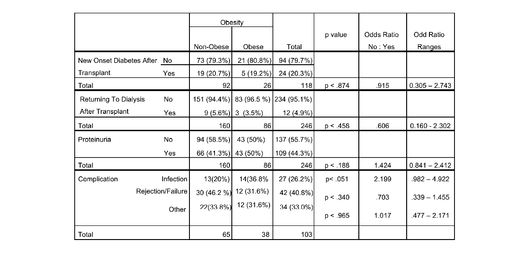Frailty and Causes of Morbidity and Mortality in Kidney Transplant Recipients
Surgery, Temple University Hospital, Philadelphia, PA
Meeting: 2019 American Transplant Congress
Abstract number: C88
Keywords: Intra-abdominal infection, Kidney, Obesity
Session Information
Session Name: Poster Session C: Kidney Complications: Late Graft Failure
Session Type: Poster Session
Date: Monday, June 3, 2019
Session Time: 6:00pm-7:00pm
 Presentation Time: 6:00pm-7:00pm
Presentation Time: 6:00pm-7:00pm
Location: Hall C & D
*Purpose: Frailty has been shown to be predictive of patient outcomes following renal transplantation. The purpose of this study is to analyze the effects of frailty on specific types of complications in patients following kidney transplantation
*Methods: We identified all patients who had undergone renal transplantation at an Urban University Hospital between the years 2013 and the first half of 2018. The frailty score based on the Modified Frailty Index 5 (MFI5) was calculated for all patients and charts were reviewed for infectious complications, rejection of allograft, new diagnosis of diabetes, return to dialysis after transplant, and proteinuria. Student’s paired T-test and odds ratios were calculated to assess the relationship between frailty index score greater than 3 and the aforementioned complications.
*Results: A total of 246 patients underwent renal transplant at a single center University hospital between 2013 and 2018, 63.3% (n=155) were male, 91.1% (n=224) underwent deceased donor transplant, 85.0% (n=209) were on dialysis prior to transplant. Based on an MFI index score greater than 3, 45.1% (n=111) patient were considered frail. There was no significant difference between the frail and non-frail kidney transplant recipients with regards to incidence of return to dialysis after transplant (p<0.4, OR 0.593), new onset of diabetes after transplant(p<0.85, OR 0.85), or proteinuria (p<0.325, OR 1.28). Additionally, in patients whohad complications following transplantation, there was no significant difference in the frail and non-frail transplant recipients and incidence of organ rejection (p<0.506, OR 0.796) or complications that were classified as not secondary to infection or rejection (p<0.807, OR 1.095). There was an association of frailty with increased risk of infectious complication (p<0.04, OR 2.261).
*Conclusions: Frail patients who underwent kidney transplantation were not more likely than their non-frail cohorts to develop diabetes after transplant, return to dialysis, to have proteinuria or to have rejection of their organ. There was an association between frailty and increased risk of infectious complication. These results have important implications for antibiotic prophylaxis in this cohort of immunosuppressed frail patients.
To cite this abstract in AMA style:
Greco L, Kaur S, Lau K, Fagenson A, Carlo ADi, Karhadkar S. Frailty and Causes of Morbidity and Mortality in Kidney Transplant Recipients [abstract]. Am J Transplant. 2019; 19 (suppl 3). https://atcmeetingabstracts.com/abstract/frailty-and-causes-of-morbidity-and-mortality-in-kidney-transplant-recipients/. Accessed March 5, 2026.« Back to 2019 American Transplant Congress

